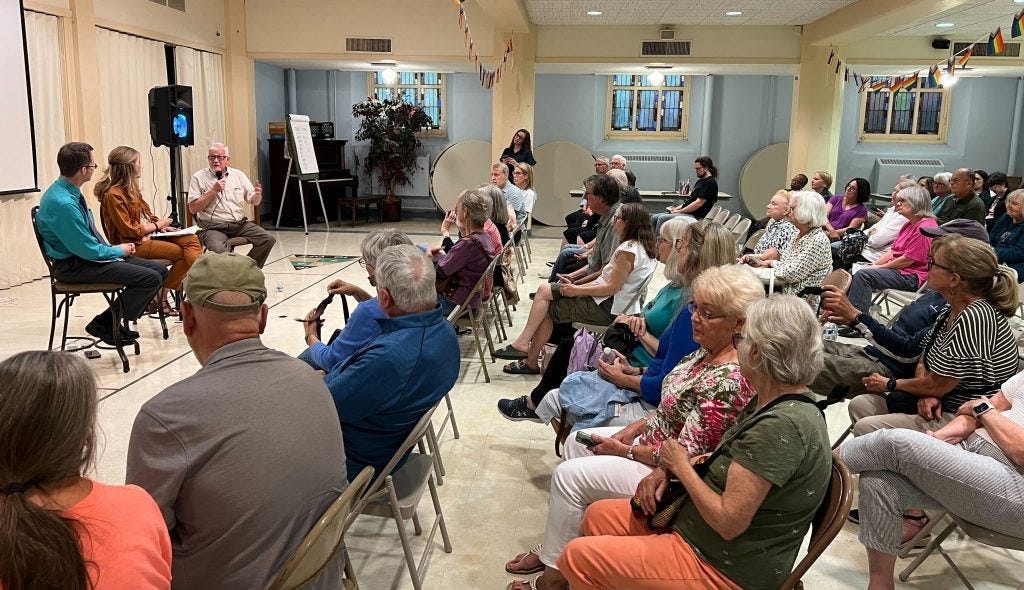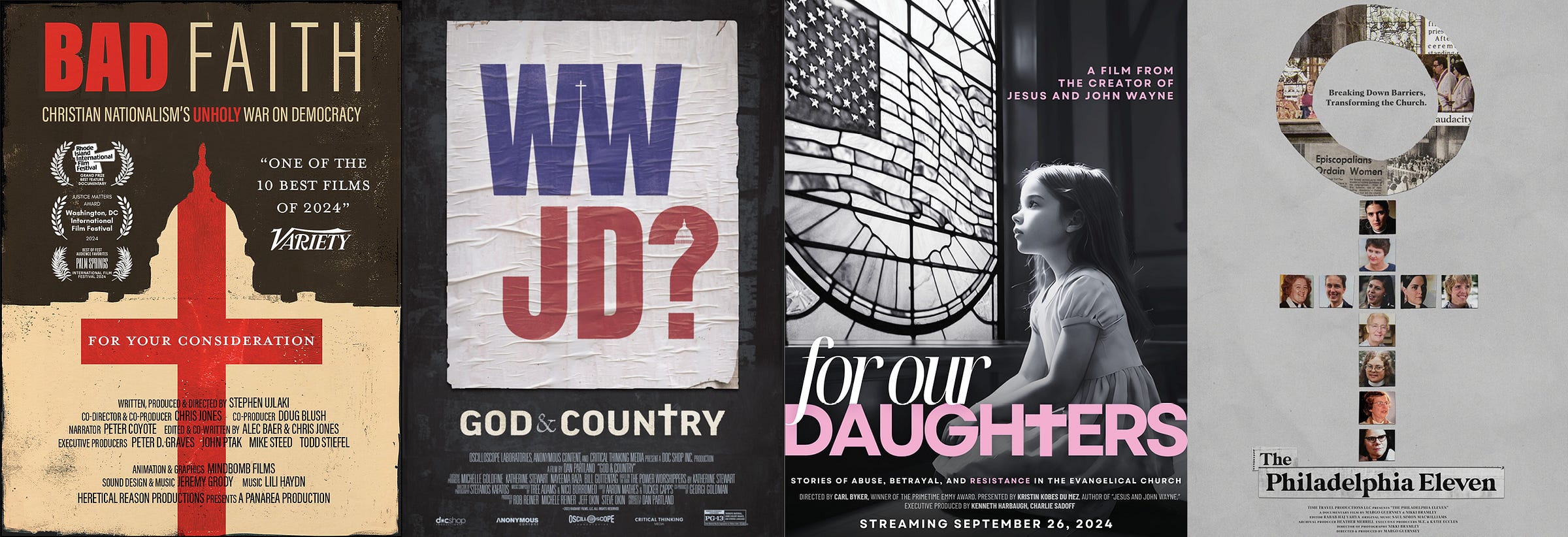Four Films for This Moment
Alfred Hitchcock once quipped, “In feature films the director is God; in documentary films God is the director.” His line might be even more true when the documentarian focuses the lens on a religious topic.
As we find ourselves in these times of political transition in the U.S., I want to share a few recent documentaries that, while looking at issues in the past, tell stories helpful for understanding and responding to our current religious and political context. By exploring how we got to where we are today, these films highlight the work needed to offer a better public witness and build a more just society.
Perhaps you’ll find yourself with extra time over the holidays — or wanting a break from sappy Hallmark movies and cold weather — and want to sit down to watch a well-made documentary. So this issue of A Public Witness recommends four recent films on issues of faith in the public square, Christian Nationalism, and patriarchy.
Bad Faith
I saw this documentary at one of its first screenings, during the Summit for Religious Freedom in Washington, D.C., in April. I’ve seen it again, serving as a panelist for a screening in Kansas City, Missouri, alongside Rachel Laser of Americans United for Separation of Church and State and Rev. Stephen Jones of First Baptist Church in Kansas City. There’s so much in the film it held my attention again.

Inspired by Anne Nelson’s book Shadow Network: Media, Money, and the Secret Hub of the Radical Right, this documentary from Stephen Ujlaki and Christopher Jacob Jones explores how the stage for the Jan. 6 insurrection was set for decades. Particularly focusing on the work of the Council for National Policy, which was founded in 1981, the movie shows a deliberate and well-funded effort to build a Christian Nationalistic political movement. In the film, you hear from an impressive group of journalists, scholars, and ministers that includes Nelson, Randall Balmer, William Barber II, Lisa Sharon Harper, Samuel Perry, Katherine Stewart, Jim Wallis, and Jonathan Wilson-Hartgrove. Many of the groups and people this documentary critiques will be in positions of greater influence and power next year.
Bad Faith is 90 minutes long and is available for screening on Amazon (free with Prime), Apple TV, Google Play, YouTube, and other places for as little as $0.99. Here’s the trailer:
God & Country
Considering the year we’ve had, it seems appropriate that two significant documentaries came out addressing the democratic threat of Christian Nationalism. There are, understandably, many areas of overlap between God & Country and Bad Faith, but they also offer some important nuances where they differ that make watching both of them worth the time. This one is inspired by Katherine Stewart’s book The Power Worshippers: Inside the Dangerous Rise of Religious Nationalism.
Directed by Dan Partland, the film garnered more attention when Rob Reiner signed on as a producer. Among the many important voices featured, the documentary includes comments from Stewart, Anthea Butler, Kristin Kobes Du Mez, Andrew Seidel, Jemar Tisby, Phil Vischer, and Andrew Whitehead.
God & Country clocks in at 90 minutes and is available for screening on Amazon (free with Prime), Apple TV, Google Play, and other places for as little as $3.99. Here’s the trailer:
For Our Daughters
This film is based on the last chapter of Kristin Du Mez’s book Jesus and John Wayne: How White Evangelicals Corrupted a Faith and Fractured a Nation. This documentary focuses on the patriarchy and culture of sexual abuse within evangelical, Christian Nationalistic churches.
Created by filmmaker Carl Byker, the movie includes interviews with Du Mez, Christa Brown, Jules Woodson, Cait West, Tiffany Thigpen, and Rachael Denhollander. In addition to exploring issues of faith and power, some of them also tell their own stories of abuse and the retraumatization that has come from Southern Baptist and other Christian clergy excusing abuse and celebrating abusers. As conservative Christian leaders defend Donald Trump, Pete Hegseth, Matt Gaetz, Robert Kennedy Jr., and other figures accused of sexual assault, this film sadly needs a much wider viewing.
For Our Daughters runs for 30 minutes and can be watched for free online:
The Philadelphia Eleven
Fifty years ago, 11 women were ordained as Episcopal priests in Philadelphia, Pennsylvania. Today, that would hardly seem newsworthy in a denomination known for its progressive theology. But these were the first women to become priests in the Episcopal Church — and the move brought significant controversy since their ordination broke the denomination’s rules. This film tells that story.
The daring move by the 11 women came with significant challenges and consequences for them and their supporters. A half-century later, they are celebrated instead of reviled. Change takes time, but it starts with someone or a small group first standing up. As Diana Butler Bass, an Episcopalian, wrote, “That’s what the documentary is about — a group of women and men who broke the rules. In doing so, they changed an entire church and its future.” Directed and produced by Margo Guernsey, the documentary features several of the women who engaged in this act of ecclesial civil disobedience and some of the male priests who supported them. As the film tackles issues of patriarchy and sexism in Christianity, it’s worth viewing whether you’re an Episcopalian or not.
The Philadelphia Eleven is 90 minutes long and can be viewed online (with the purchase of an $11 ticket) now thru Jan. 6, 2025. Here’s the trailer:
Each of these four documentaries is well made and includes important voices addressing critical issues of historical and present concern. These films offer insights to understand how we got to where we are politically and religiously. They won’t give you a happy story like a Hallmark Christmas love movie, nor will they bring laughter like Elf or A Christmas Story. But these are films for our time.
As a public witness,
Brian Kaylor



